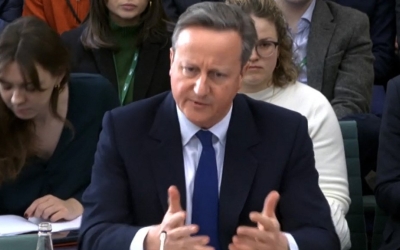UK foreign secretary accused of dodging questions over arms exports to Israel

Foreign Secretary David Cameron has been accused of dodging questions about UK policy on arms exports to Israel following an exchange of letters with the Foreign Affairs Committee chair.
Alicia Kearns, the Conservative MP who leads the influential body, said on Tuesday that Cameron's response to a 29 January letter had not answered all of her questions and raised further ones.
“It is telling that the [Foreign Office] does not answer our question on how many times export licence applications for Israel have been referred to ministers in the last 12 months," Kearns commented.
"If none have been referred, the government should say so.”
Kearns called on the Foreign Office (FCDO) and Department for Business and Trade to be more transparent about how UK arms exports to Israel are being reviewed.
New MEE newsletter: Jerusalem Dispatch
Sign up to get the latest insights and analysis on Israel-Palestine, alongside Turkey Unpacked and other MEE newsletters
Cameron sent two letters this month to Kearns about Israel’s ongoing war on Gaza, which the Foreign Affairs Committee has published this week.
One letter focuses on Israel’s planned military offensive in Rafah. The other deals with UK arms exports to Israel, in response to the letter Kearns sent to Cameron on 29 January, after he had given evidence to the committee in a hearing last month.
Revealing court document
Kearns told Cameron on 29 January that she was writing in light of a document filed by the business department at the High Court, in a claim for a judicial review of the continuance of UK arms sales to Israel.
The document included internal discussions within the Foreign Office and extracts of papers sent to ministers as officials assessed whether Israel had breached international humanitarian law in Gaza. They were also assessing how to advise Cameron regarding UK arms exports to the country.
The British government is obligated, under its arms exporting criteria, to suspend licences for arms exports if it determines that there is a clear risk that British weapons might be used in violations of international law.

During the Foreign Affairs Committee session on 9 January, Cameron was pressed repeatedly by Kearns and Scottish National Party MP Brendan O’Hara about whether he had been advised that Israel had breached international law.
Cameron told the committee that he worried Israel might have breached international law and said he had been given advice “consistent with the fact that we have not changed our export procedures”. He did not say whether a formal review had taken place.
The court documents filed by the business department show that the Foreign Office had conducted at least three assessments between 10 November and 8 December.
Cameron also told the committee that the decision on arms export licences was for the business department to make, with advice from the Foreign Office.
But the final decision on whether Israel was committed to complying with the law rested with Cameron, according to the court document, which says he was “satisfied that there was good evidence to support a judgment that Israel is committed to comply with international humanitarian law”.
'Good evidence'
Kearns highlighted this discrepancy in her letter to Cameron, along with a list of 15 questions.
“Why was your decision limited only to determining whether there was ‘good evidence’ to support a judgment that Israel is committed to comply with international humanitarian law?" she asked.
“Did this mean you were unable to reach a judgment as to the reliability of such a commitment?”
'I am surprised that no licence applications have been escalated to the inter-departmental disputes procedures in the last three months'
– Alicia Kearns MP in a letter to David Cameron
In his response, Cameron confirmed a fact first revealed in the court documents: that the Export Control Joint Unit - a cross-departmental body overseeing UK export controls and licensing for military and dual-use items - had initiated a “change in circumstances” review after Hamas's 7 October attacks, to look at arms export licences to Israel.
He also confirmed, as the court document had shown, that he decided on 12 December that there was not a clear risk that exported items would be “used to commit or facilitate a serious violation of international humanitarian law” and recommended that Business and Trade Secretary Kemi Badenoch keep licences “under careful review”.
“The [Foreign Office] continues to assess Israel’s commitment and capability to comply with [international humanitarian law] and its past record of compliance,” he said.
“I regularly review advice on those assessments and my actions have been consistent with that advice.”
He also said that no licence applications for arms exports had needed to be escalated to a dispute resolution mechanism, which is mediated by the Cabinet Office.
Further questions
Kearns said on Tuesday that Cameron's response had raised further questions, and expressed surprise that no applications had been escalated.
“Given the high level of concern over the conflict between Hamas and Israel, I am surprised that no licence applications have been escalated to the inter-departmental disputes procedures in the last three months,” she said.
“The FCDO plays a key role in export licence decisions with FCDO officials permanently located within the ECJU providing advice to the Trade Secretary, including leading on the international humanitarian law implications of licensing decisions.”
She called on both departments to “set out more fully how existing licences are being kept under ‘careful review’ and how they will ensure that UK export controls adapt quickly to a rapidly changing situation”.
The publication of Cameron’s letters comes as the UK High Court has rejected a legal case for a judicial review into UK arms sales to Israel. The case was lodged by a Palestinian human rights group and a UK-based legal organisation.
Lawyers who brought the case argued that, given the evidence available and the government’s criteria, the trade secretary’s decision not to suspend licences was irrational.
The court, however, said there was a “high hurdle” to establish that the department had been irrational, and there was "no realistic prospect" the hurdle would be overcome with the case. The groups say they will appeal.
Middle East Eye delivers independent and unrivalled coverage and analysis of the Middle East, North Africa and beyond. To learn more about republishing this content and the associated fees, please fill out this form. More about MEE can be found here.





